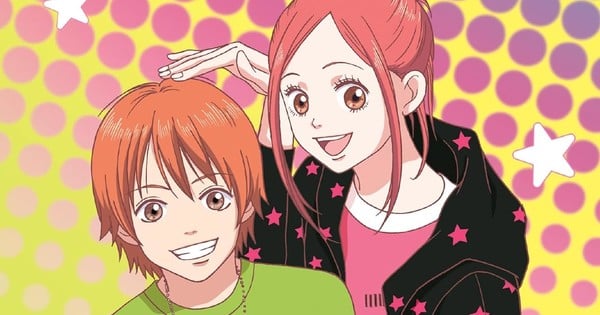Curated From www.animenewsnetwork.com Check Them Out For More Content.
Lovely Complex seems like an unlikely candidate for a dubbed Blu-ray release, even from a company that specializes in releasing older anime like Discotek. It first came out in 2007, natively animated in 480p, and the simple, frequently off-model animation doesn’t really demand a glossy upscale. As a shōjo romantic comedy, it’s not exactly expected to sell the kind of numbers that would justify the expense of making a brand-new dub.
And yet, here we are. For all that, it’s not the type of glossy action series that flies off the shelves and makes up Discotek‘s bread and butter. It has long had a cult following, and I am part of that cult. From the first minute, I fell in love with the protagonist, Risa Koizumi, when she got in trouble after being caught falling asleep standing up during the school assembly. She is, in a word, big: big voice, big feelings, big personality, big height. The male lead, Atsushi Ohtani, has just as big a personality, but at 5’1″, his stature can only be described as “tiny.”
The two leads set apart what is, in many other ways, a fairly typical setup for a romantic comedy. After months of enmity, Risa and Ohtani decide to help set one another up with a height-appropriate partner. When that fails, the two make a bet over who can find someone to date first, but soon after, Risa realizes she’s totally in love with Ohtani, even though she never thought she could love a boy smaller than her, much less a full head shorter. It turns out Ohtani has similar reservations about dating a girl who is much taller than him and rejects Risa’s advances, but Risa can’t let go of her feelings for him.
The plot can get frustrating, especially when Risa and Ohtani spend over half of its 24-episode run circling around one another. The two of them are caught in a seemingly endless loop of comic misunderstandings and mismatched feelings. The story’s events are entirely grounded in mundane reality as the characters go to school, karaoke, concerts, and so on. Their worries are mostly related to the same, along with their relationships. They are ordinary in every way, without extreme situations to spice things up or distract from the main conflict. Even the secondary characters are in happy, stable relationships. As a result, the series starts to drag a bit past the midpoint when it feels like they’ll never get it together.
But still, the characters and their relationships make it shine, even in the darkest times. That groundedness, for all that it keeps the plot from veering into new territory. At the same time, Ohtani takes his sweet time figuring out his feelings for Risa as she cycles through trying to move on and deciding to remain steadfast in her feelings, keeping it relatable to its target audience of young women. Even now, well past high school, I can see my teenage self in Risa: a dorky weirdo who can’t get a handle on traditional femininity, just a ball of emotions, insecurities, and neuroses. She takes chances, makes mistakes, and gets messy as she falls in love with a boy who is just as neurotic and insecure.
That may make it sound like a Woody Allen movie, but the lively writing keeps the characters’ chemistry fresh. Risa and Ohtani’s dynamic, in particular, feels rare for a shōjo series; they’re good friends first, supporting one another and enjoying their mutual interests together. They squabble a lot, but that’s just their communication style. There’s a playful quality to it, and whenever they unintentionally cross a line into cruelty, they do their best to make amends and move forward. The supporting cast is also excellent; while all of them are likable, Risa’s friend Nobuko merits a special mention. She’s the voice of reason whenever Risa gets too wrapped up in her feelings and her biggest cheerleader, all with a dry sense of humor that imbues her with a blunt charm.
This new release from Discotek marks the first time Lovely Complex has been released in high definition, upscaled from its native 480p with the help of AstroRes. For the most part, it looks beautifully crisp and bright, a huge step up from the blurriness of DVDs on modern screens. The only hiccups tend to be when the camera is zooming or panning; fortunately, this isn’t the kind of show that calls for a lot of fancy camerawork. The sharpness does, however, make it clearer than ever that this isn’t a great-looking show. Every time a character’s on-screen, there’s an approximately 50% chance that they’re off-model; for background characters and extras, that percentage is even higher. Through solid storyboarding, visual gags, and exaggerated character acting, it stays visually engaging. The faces Risa makes are the stuff of legend, and once again, I commend the series for being unafraid to let the heroine look ugly.
This release has another first: an English-dubbed version of the series. The dub caught a lot of attention when the assistant writer/director, Brendan Blaber, wrote a lengthy post on his Patreon about how much he hated the series and especially Risa, and how he and the other writers “improved” it by altering the characters and their relationships. His take on the series betrayed an inability or refusal to understand any subtext or character growth as he repeatedly mischaracterized story events. He took it down soon after, but the damage was done, and Lovely Complex became a new flashpoint in the anti-localization culture war that has plagued anime fandom in recent years.
I’m well familiar with the Japanese performances, which I love, so for this review, I watched the dub with subtitles for direct comparison. In a vacuum, it’s a loose but pretty good dub. The performances are consistently strong, and the writing is snappy. Howard Wang as Ohtani is the biggest weak point; when he’s not yelling, he mostly sounds exhausted. Many of the jokes have been rewritten, but that’s expected; comedy tends not to translate well, so as long as the characters and story stay intact, adjusting the humor is the best way to keep things in the spirit of the original. However, many new jokes break the fourth wall, throwing a little wink and nudge at the audience that belies a lack of confidence in the material.
While many of Blaber’s claims didn’t make it into the final dub, such as his refusal to include lines where the characters praise Aya Nakahara, the original artist, when she makes a cameo as a stylist, there is a decidedly different tone to some of the interactions. Risa spends much more time apologizing to Ohtani, while Nobu’s advice to Risa skews more toward lectures. Nothing is implied anymore; all growth must be explicitly stated, or it doesn’t happen. It gives the series a sense of didacticism that didn’t exist before, which gives the impression the writers didn’t have any faith in the viewers to read between the lines.
Outside of the standard clean opening and closings, all the extras relate to the dub: commentary tracks from the primary director, Marissa Lenti, Blaber, and one of the actors each on episodes 3 and 5, and a blooper reel. I generally avoid dub commentary tracks because the actors usually haven’t watched the show through and don’t have much interesting to say, if anything at all. Here, all the commentators are friends and intimately familiar with the show after the grueling dubbing process. This makes for a pleasant and informative conversation as they discuss what went into some of their choices. Unsurprisingly, Blaber keeps his unfiltered opinions to himself in the commentary tracks as the three chat, making for a much less abrasive experience than I expected. The bloopers are also worth watching, and made me laugh out loud a bunch of times.
If Lovely Complex, with its flawed, often-frustrating protagonists who can’t seem to get it together and figure out their feelings, doesn’t sound appealing to you, then skip this. For everyone else – fans of romantic comedies with human characters, people who love and relate to weirdo protagonists, and those who already know the series and wonder whether this release is worth shelling out for – I heartily recommend picking up the Blu-ray. Discotek has done a wonderful job restoring this classic series, including a dub that, despite its issues, I generally had a good time watching.

